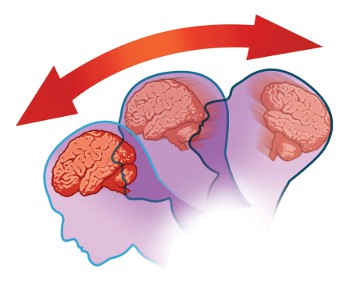Concussions. They’re amazingly common. Untold numbers of people coming into emergency rooms don’t even realize they’ve suffered a concussion. I think people need the information. Here’s a short summary of concussion symptoms—and what to do after you’ve suffered a concussion.
Trotting downstairs one late-December evening to watch the evening news, I missed the bottom step and crashed full-on into the living-room door frame. I didn’t lose consciousness, but the impact left me with more than a lump on my forehead.
Each year, more than 2.5 million Americans show up in emergency rooms with a concussion (one form of traumatic brain injury, or TBI), and 50,000 die of one. The numbers are staggering in other countries, too.
Compounding the situation, symptoms of concussion may emerge over the next days, weeks, and months. Because alone or in combination, the symptoms of concussion could indicate many other health conditions, people with concussions may also get treated for problems they don’t have, while the underlying brain injury goes unnoticed.
What’s a Concussion?
The Centers for Disease Control defines concussion as a “bump, blow, or jolt to the head…that causes the head and brain to move rapidly back and forth. This sudden movement can cause the brain to bounce around or twist in the skull, creating chemical changes in the brain and sometimes stretching and damaging brain cells.”
According to experts, most concussions aren’t life-threatening. But even a mild concussion can be life-altering.

A Wide Variety of Symptoms
Neuroscientists say each concussion (and its accompanying symptoms) is unique. There’s no way of predicting how a concussion will affect a given person. Individuals may experience only a few or many symptoms, any of which can vary in intensity and duration.
Here are a few of the broad variety of symptoms people report after suffering a mild concussion:
- Brain-fog, confusion, difficulty concentrating.
- A feeling of not being oneself, or of disconnection from the world around.
- Impaired vision. Your two eyes may not converge properly.
- Dizziness or balance problems.
- Difficulty making decisions, even small ones.
- Memory loss, or difficulty remembering new information.
- Difficulty reading and writing more than a paragraph or two before becoming exhausted by the effort.
- Difficulty following and participating in a conversation.
- Difficulty finding the word you’re searching for.
- Sleeping problems; either sleeping too much or having difficulty sleeping or staying asleep.
- Circadian (24-hour) rhythm disruption. Groggy much of the day, feeling peppy and alert around suppertime and sometimes most of the night.
- Hyperstimulation. Shopping in big stores or socializing in groups of more than a few people may feel overwhelming and exhausting.
- Hypersensitivity to light, sound, and unexpected movement.
- Changes in hearing, smell or taste.
- Emotional instability, depression; diffuse, generalized fear.
How long does it take you to recover from a concussion?
Improvements proceed differently for each individual.
You may recover in 24 hours or you could spend weeks recovering. Most people recover within three weeks.
However, symptoms may emerge well after the concussion event; some may last for years, or fade, then reappear. Even if you can’t see your injury, it still exists and you still need to take care.
What To Do After a Concussion
If you’ve suffered a blow to the head, whiplash, or any kind of serious shaking, even if you experienced no immediate symptoms, please see your doctor for a checkup and to get all the details of your event into your health record.
The road to improving your brain health begins with rest, and plenty of it. Physical rest, emotional rest, and especially rest from tough mental/cognitive tasks such as reading, writing, managing complex financial transactions, etc.
- Drink plenty of water, but go light (or not at all) on alcohol and sweetened drinks.
- Eat a nutrient-rich diet. Real food. Lots of healthy vegetables and fruit.
- Stay away from or limit screens (cell phone, TV, computer) if possible for a few weeks, even a few months.
- After the immediate symptoms wear off, concussion can benefit from light exercise such as slow walking or swimming. See 10 tips to start exercising.
- Get outside into a natural setting whenever possible. Nature heals.
- Have patience. Our brains are extraordinarily plastic, and you may develop new connections and compensatory
- When confusion and anxiety set in, it helps to sit back, close your eyes, and take a few deep breaths. No matter where you are, your breath is always available.
- Speak up! Let family, friends, and coworkers know what you’re experiencing and how you feel. For example, explain that you may look and sound okay, but you feel strange and disoriented, detached from ordinary reality. Or say that you can’t attend some event (a wedding, a family reunion), because you can’t yet bear the hyperstimulation of so many people in one space.
- Seek support. Particularly helpful: sharing stories with other folks who’ve experienced one or more concussions.
Important: Even if you’ve been doing well, see your doctor in the aftermath of a blow to the head if you lose consciousness, suffer severe headaches, extreme dizziness, vomiting, and loss of vision, balance, or memory.
Afterwords
Though the “mild” concussion I suffered in late 2014 indeed altered my life profoundly, my hard work at getting better has paid off, and my amazingly plastic brain has rebuilt itself in ways I couldn’t have imagined in the immediate aftermath. I’ve learned so much, and I’m grateful for all of it.
Learn more
The Ghost in My Brain: How a Concussion Stole My Life and How the New Science of Brain Plasticity Helped Me Get It Back Clark Elliott’s extraordinary account of his complete recovery from a “mild” 13-year concussion.
What impact will a concussion have on a person’s life? Although addressing impacts of “moderate to severe” concussions, this information is useful for victims of mild concussions, too.
Report to Congress on Traumatic Brain Injury in the United States: Epidemiology and Rehabilitation Comprehensive 2015 report from the Centers for Disease Control and Prevention Post-concussion syndrome.











Comments